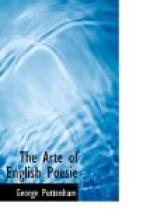as would neither make a sweete cadence, nor easily
find any word of like quantitie to match them.
And the accented sillable with all the rest vnder
him make the cadence, and no sillable aboue, as in
these words,
Agillitie, facillitie, subiection,
direction, and these bissilables,
Tender, slender,
trustie, lustie, but alwayes the cadence which falleth
vpon the last sillable of a verse is sweetest and
most commendable: that vpon the penultima_
more light, and not so pleasant: but falling
vpon the
antepenultima is most vnpleasant of
all, because they make your meeter too light and triuiall,
and are fitter for the Epigrammatist or Comicall Poet
then for the Lyrick and Elegiack, which are accompted
the sweeter Musickes. But though we haue sayd
that (to make good concored) your seuerall verses
should haue their cadences like, yet must there be
some difference in their orthographie, though not in
their sound, as if one cadence be [
constraine]
the next [
restraine] or one [
aspire]
another [
respire] this maketh no good concord,
because they are all one, but if ye will exchange
both these consonants of the accented sillable, or
voyde but one of them away, then will your cadences
be good and your concord to, as to say,
restraine,
refraine, remaine: aspire, desire, retire:
which rule neuerthelesse is not well obserued by many
makers for lacke of good iudgement and a delicate eare.
And this may suffise to shew the vse and nature of
your cadences, which are in effect all the sweetnesse
and cunning in our vulgar Poesie.
CHAP. VIII
How the good maker will not wrench his word to
helpe his rime, either by falsifying his accent, or
by untrue orthographie.
Now there can not be in a maker a fowler fault then
to falsifie his accent to serue his cadence, or by
vntrue orthographie to wrench his words to helpe his
rime, for it is a signe that such a maker is not copious
in his owne language, or (as they are wont to say)
not halfe his crafts maister: as for example,
if one should rime to this word [Restore] he
may not match him with [Doore] or [Poore]
for neither of both are of like terminant, either
by good orthography or in naturall sound, therfore
such rime is strained, so is it to this word [Ram]
to say [came] or to [Beane [Den_] for
they sound not nor be written alike, & many other like
cadences which were superfluous to recite, and are
vsuall with rude rimers who obserue not precisely
the rules of [prosodie] neuerthelesse in all
such cases (if necessitie constrained) it is somewhat
more tolerable to help the rime by false orthographie,
than to leaue an unpleasant dissonance to the eare,
by keeping trewe orthographie and loosing the rime,
as for example it is better to rime [Dore] with
[Restore] then in his truer orthographie, which
is [Doore] and to this word [Desire]
to say [Fier] then fyre though it be otherwise




